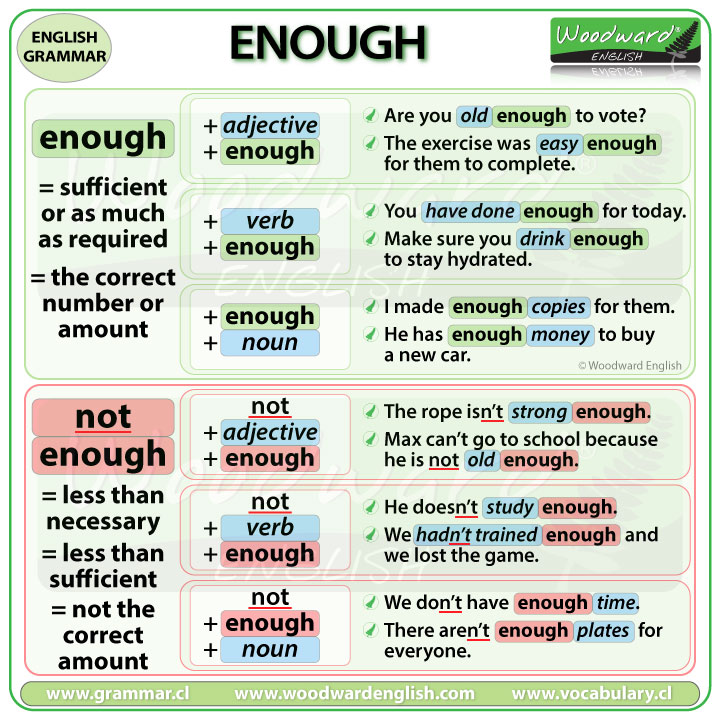Max is two years old.
Can Max go to school at this age?
Not really, he is only two years old. We can say:
- Max is not old enough.
Here we used an adjective + enough.
What does enough mean?
Enough can mean sufficient or sufficiently or as much as required or needed.
But here it says NOT enough.
Not enough can mean less than necessary, less than sufficient.
Max is not old enough means he doesn’t have the necessary age. His age is less than sufficient.
In this lesson we are going to look at the word ENOUGH and its meanings, uses and correct position in a sentence.
Adjective + enough
As we have seen, enough appears AFTER an adjective.
Let’s see some example sentences:
- The coffee is not hot enough.
Here we are saying the coffee is not sufficiently hot.
- I can’t hear the music. It’s not loud enough.
The volume is not the sufficient level for me to be able to hear it.
- He wasn’t experienced enough for the job.
This means he didn’t have sufficient experience for the job.
- The room is large enough for all the students
Here enough is used in a positive way. It doesn’t have NOT before it, so it means the room has the sufficient space for all of the students. The space that is necessary.
Note: We don’t say enough hot or enough loud or enough experienced or enough large.
Enough goes AFTER the adjective.
Now, you may have noticed after large enough we have the preposition FOR + students.
After enough, we can have for + person / people.
Let’s look at some more examples of this.
Adjective + enough + for + person
Before we said:
- The coffee is not hot enough.
We didn’t mention if it is not hot enough for me, for you, or some other person.
To say who this refers too, we add for + person / people. For example:
- The coffee is not hot enough for me.
And another example:
- Is the music loud enough for you?
Here I specify the person… for you… for you the old man.
After enough we can also have an infinitive, which is the base form of a verb. An infinitive has the form TO + VERB. The order is:
Adjective + enough + infinitive
Remember Max?
- Max can’t go to school because he is not old enough.
We can change the order of this and say:
- Max is not old enough to go to school.
Notice how we used the infinitive (to go) after enough.
A couple more examples:
- She is old enough to vote.
Yes, she has the sufficient age to be able to vote.
- The phone is small enough to put in your pocket.
Yes, it has a small size that is the sufficient amount to be able to put it in your pocket.
And if you want, you can combine for + person with an infinitive.
The correct word order is:
Adjective + enough + for + person + infinitive
Let’s look at some example sentences:
- The car is cheap enough for us to buy.
Yes, I have a sufficient amount of money to be able to buy the car.
- It was easy enough for them to complete.
They didn’t have any problems to complete it because it was easy for them.
- The rope isn’t strong enough for us to use.
Yes, it doesn’t have the sufficient strength for us to be able to use it.
- The room isn’t quiet enough for me to study.
Exactly, I like to study in total silence.
Verb + enough
We can use enough after a verb.
- We hadn’t trained enough and lost the game.
We hadn’t trained a sufficient amount so as a consequence, we lost the game.
- I think you have done enough.
Yes, you have done a sufficient amount.
- He doesn’t study enough.
Yes, he should study more.
- You look too thin. You don’t eat enough.
Exactly, you don’t eat a sufficient amount of food.
Our last sentence was:
- You don’t eat enough.
This consists of a verb (eat) + enough.
This means you don’t eat a sufficient amount or an adequate amount.
Sometimes there is an adverb between the verb and enough.
Adverb + enough
For example:
- You don’t eat healthily enough.
Remember: an adverb gives us more information about the verb, it says how or in what way.
In this last sentence it refers to in a healthy way.
Some more examples:
- I didn’t leave early enough and I arrived late.
- They didn’t react quickly enough. (and they lost the opportunity)
Did you notice how there was a verb before the adverb to give the order: verb + adverb + enough
Adverb + enough + infinitive
Again, sometimes we use an infinitive after enough.
- He isn’t running fast enough to win the race.
- I didn’t go early enough to buy a ticket.
- You’re not working hard enough to get a pay rise.
Enough + Noun
After enough we can use a noun: Enough + noun
This noun can be a plural countable noun or an uncountable noun.
Here enough means the correct number or amount. As many or as much as someone needs or wants.
- Is there enough room in the car for me?
In a way, this means… Is there a sufficient amount of room for me?
- He has enough money to buy a new car.
Yes, he has been saving for years and now he has enough money or the sufficient amount of money to buy one.
- We do not have enough cups for everyone.
You can see the last sentences is negative and uses not + enough which means it is less than what is needed, it is an insufficient amount.
This means we don’t have as many cups as we need. We don’t have the sufficient amount.
More examples of enough + noun
- I made enough copies of the report for everyone.
- Do you have enough money for this weekend?
- They forgot to buy enough food for the camping trip.
- Are there are enough people for the job?
- Is there enough time to finish the test?
Enough + Noun + Infinitive
After enough + noun we can also have an infinitive.
- There isn’t enough paint to finish the wall.
- Do we have enough time to have lunch?
- I don’t have enough money to buy a laptop.
Enough as a pronoun
Enough can be used as pronoun to replace enough + noun.
A: Have you got enough money?
B: No, I don’t have enough.
Here the pronoun enough is used instead of enough money to avoid repetition.
A: Would you like some more cake?
B: No thanks, I have had enough. (enough = enough cake)
We don’t repeat cake to avoid sounding repetitive. It is obvious we are talking about cake.
A: I bought some pizza.
B: Do we have enough for everyone?
Here enough refers to enough pizza.
ENOUGH Summary Chart

